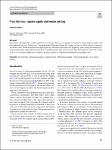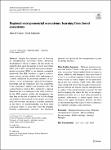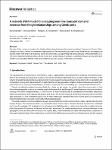Search
Author
- Marina, Dabić (3)
- Christa, Sys (2)
- Domingo, Ribeiro-Soriano (2)
- Gittell, Ross (2)
- next >
Subject
- kinh tế (26)
- Economics (12)
- Management science (7)
- Development Economics (6)
- next >
Date issued
- 2020 - 2023 (306)
- 2010 - 2019 (47)
- 2009 - 2009 (1)
Has File(s)
- true (354)
Search Results
Prices have a leverage effect on firm profits. Prices, however, have also an impact on customer’s perceived price fairness and thus indirectly on firm’s bottom line. A growing body of literature shows this. Papers on the level of the fair price, however, are rather scarce. Based on different concepts of justice, two levels of fair prices are proposed: square equity and mean prices. I run an experiment which shows that both are considered fairer than cost-based or value-based prices. The results can be used to assess fairness implications of prices ex ante and hence complement traditional pricing approaches. |
Narratives are playing an increasingly important role in economics since their performative character has been realised. Banks are not unaffected by this, as they face many future challenges and are thus directly affected by narratives. For this reason, this article aims to reveal the future prospects within the academic landscape on the basis of a scoping literature review to create transparency about where the narratives come from. So, it is not the intention to make another prediction about the future of the banks. The paper presents contributions that make explicit statements about the future of banks, either a description of the future or an assessment of the future prospects of banks. Two databases were searched in this context, IDEAS/RePEc and Scopus, for the period from 2001... |
To make the last mile of parcel delivery more efficient, service providers offer an increasing number of modes of delivery as alternatives to the traditional and often cost-intensive home delivery service. Parcel lockers and pickup stations can be utilized to reduce the number of stops and avoid costly detours. To design smart delivery networks, service providers must evaluate different business models. In this context, a multitrip vehicle routing problem with delivery options and location-dependent costs arises. We present a data-driven framework to evaluate alternative delivery strategies, formulate a corresponding model and solve the problem heuristically using adaptive large neighborhood search. By examining large, real-life instances from a major European parcel service, we det... |
Despite the emerging body of literature on entrepreneurial ecosystems (EEs), theoretical development is still in its infancy. In this article, we explicitly draw upon the analogy of forest ecosystems (FEs) with an EE to extrapolate the regional entrepreneurial ecosystem (REE) as an alternate conceptual framework. The REE considers a region’s socioeconomic activity and the stability of its performance as a whole, influenced by partitioned interests of economics, social arrangements, physical environment, knowledge and the technology that each contributes to the community’s industry and economic order. We contend that it is when an EE is defined by a regional dimension that it is analogous to the study of forests. In this REE analysis, neither the entrepreneur nor their firm are the u... |
Performance feedback is an integral element of an accounting system, and firms provide this feedback at varying frequencies to their employees. This paper explicates the impact of an interim performance evaluation on the principal’s surplus using a dynamic two-period agency model. Two settings are discussed: single-purpose use, wherein accounting information is used solely for control purposes, and dual-purpose use, in which accounting information is used for production and control. Results demonstrate that the optimality of interim performance evaluations depends on the use of information and the interdependence of period outcomes. Furthermore, neither setting entails strict dominance with regard to carrying out interim evaluations or not. It implies that an interim evaluation can ... |
We consider the problem of measuring the efficiency of decision-making units with a ratio-based model. In this perspective, we introduce a framework for robustness analysis that admits both interval and ordinal performances on inputs and outputs. The proposed methodology exploits the uncertainty related to the imprecise data and all feasible input/output weight vectors delimited through linear constraints. We offer methods for verifying the robustness of three types of outcomes: efficiency scores, efficiency preference relations, and efficiency ranks. On the one hand, we formulate mathematical programming models to compute the extreme, necessary, and possible results. On the other hand, we incorporate the stochastic analysis driven by the Monte Carlo simulations to derive the probab... |
Autism is characterized by peculiar sensory processing. The sensory features of a place may have a crucial impact on the decision a person with autism makes when choosing what to visit in a tourist experience. We present a map-based mobile app, conceived for people with mid to high-functioning autism, which exploits sensory features of places to filter the information displayed and suggest locations that may be suitable for their idiosyncratic needs. The mobile app also exploits the crowdmapping paradigm in order to gather these features from the community of users, since they are not publicly available. We describe the results of a composite user evaluation of the app, made up of a task experiment, a field study, and an online questionnaire, which aims to understand (i) whether the... |
Drawing from the conservation of resources theory, we explore how two personal resources (satisfaction with work–life balance and experience of flow at work) contribute to two important outcomes in entrepreneurship: entrepreneurs’ subjective well-being and firm growth. Although previous research has emphasized the importance of personal factors for firm growth and explored a variety of factors affecting entrepreneurs’ subjective well-being, little attention has been paid to the role of satisfaction with work–life balance as a critical personal resource for entrepreneurs. With this study, we find that entrepreneurs’ satisfaction with work–life balance is positively associated with subjective well-being, which, in turn, mediates the relationship between satisfaction with work–life bal... |
In recent years, the research of statistical methods to analyze complex structures of data has increased. In particular, a lot of attention has been focused on the interval-valued data. In a classical cluster analysis framework, an interesting line of research has focused on the clustering of interval-valued data based on fuzzy approaches. Following the partitioning around medoids fuzzy approach research line, a new fuzzy clustering model for interval-valued data is suggested. In particular, we propose a new model based on the use of the entropy as a regularization function in the fuzzy clustering criterion. The model uses a robust weighted dissimilarity measure to smooth noisy data and weigh the center and radius components of the interval-valued data, respectively. |
The aim of this study is to analyze the freight relationships between three major mainland Greek ports (Piraeus, Thessaloniki and Volos), based on containers’ transportation. The methodology used is the Global Vector Autoregressive (GVAR) model. The empirical analysis is based on time series data spanning the period January 1998–December 2012. The most important finding is that a shock in one port doesn’t have, in general, a significant impact on any other port and the corresponding effects settle down relatively quickly, usually in less than two months. |










